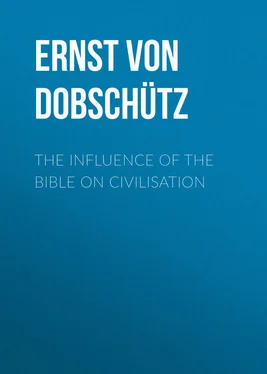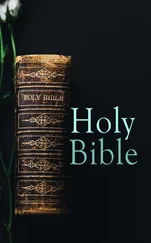Ernst Dobschütz - The Influence of the Bible on Civilisation
Здесь есть возможность читать онлайн «Ernst Dobschütz - The Influence of the Bible on Civilisation» — ознакомительный отрывок электронной книги совершенно бесплатно, а после прочтения отрывка купить полную версию. В некоторых случаях можно слушать аудио, скачать через торрент в формате fb2 и присутствует краткое содержание. Жанр: foreign_religion, foreign_antique, foreign_prose, на английском языке. Описание произведения, (предисловие) а так же отзывы посетителей доступны на портале библиотеки ЛибКат.
- Название:The Influence of the Bible on Civilisation
- Автор:
- Жанр:
- Год:неизвестен
- ISBN:нет данных
- Рейтинг книги:3 / 5. Голосов: 1
-
Избранное:Добавить в избранное
- Отзывы:
-
Ваша оценка:
- 60
- 1
- 2
- 3
- 4
- 5
The Influence of the Bible on Civilisation: краткое содержание, описание и аннотация
Предлагаем к чтению аннотацию, описание, краткое содержание или предисловие (зависит от того, что написал сам автор книги «The Influence of the Bible on Civilisation»). Если вы не нашли необходимую информацию о книге — напишите в комментариях, мы постараемся отыскать её.
The Influence of the Bible on Civilisation — читать онлайн ознакомительный отрывок
Ниже представлен текст книги, разбитый по страницам. Система сохранения места последней прочитанной страницы, позволяет с удобством читать онлайн бесплатно книгу «The Influence of the Bible on Civilisation», без необходимости каждый раз заново искать на чём Вы остановились. Поставьте закладку, и сможете в любой момент перейти на страницу, на которой закончили чтение.
Интервал:
Закладка:
Euplus does not stand alone. I could mention a dozen martyrs whose acts all give the same impression. Sometimes a gathering of men and women is apprehended while reading the Bible, and the whole company is forthwith carried away to the most painful tortures.
These Christians knew what the Bible was to them. All declamations of later theologians about the inspiration and the authority of the Bible count for nothing compared with this testimony.
After all, we do not wonder that the Bible became a civilising power as soon as Christianity had won its victory.
II
THE BIBLE BEGINS TO RULE THE CHRISTIAN EMPIRE (325-600 A. D.)
After the persecution by Diocletian a new era began. Constantine proclaimed tolerance, and by and by Christianity became the religion of the empire. The victory of Christianity was a victory of the Bible as well. This finds its expression in the remarkable fact that the first Christian emperor, the immediate successor of those who persecuted the Bible and tried to destroy it, ordered fifty splendid copies of the Bible to be prepared at his expense for the churches of the newly founded capital, Constantinople. Some scholars have thought that one or two of these copies still survive in the famous manuscript discovered by Tischendorf in the Convent of Mount Sinai (Plate III), or in the Codex Vaticanus at Rome. I venture rather to think that both copies belong to the period of Constantine's sons. But the fact that the Bible, after a period of destruction when most of the earlier copies were burned, got a surprising circulation under official direction accounts, I think, for a puzzling feature in the transmission of the text. From the Old Latin and the Old Syriac, as well as from the testimony of the fathers, we can infer that various forms of the Greek text must once have been widely circulated, which have now almost disappeared, whereas most of our present Greek manuscripts give a text evidently based on a late official recension. Looking at Diocletian's attempt to destroy the Bible altogether and at Constantine's official order to provide a large number of manuscripts, we easily understand the situation. The older forms of text had been swept away; now there was room to supply their place with the learned attempts of later scholars from the schools of Origen or Lucian who endeavoured to bring in more critical texts.
End of St. Mark (15: 16-16: 8) and beginning of St. Luke (1: 1-18); Mark 16: 9-20 is missing; 15: 47 is added at the lower margin by a later hand; remark the numbers of Eusebius's sections and canons. The eight columns of the open book recall the roll-system.
Reduced one-fifth from the fac-simile edited by Prof. Lake and published by the Clarendon Press
(Oxford and London).
Another change is to be mentioned at the same time. The old form of papyrus rolls became obsolete and the parchment book took its place. The use of this latter form seems to originate in the law schools; the codex, or parchment book, is at first the designation of a Roman law-book. But at an early date the Christian church adopted this form as the more convenient one and gave it its circulation. We hardly say too much when we call the Bible the means by which our present form of book came into general use. Even if the Bible had done nothing else for civilisation than to give mankind the shape of its books that would be a great deal (Plate IV).
The form of a parchment book, or codex, would admit of the copying of several books in one volume. The great Bibles of the fourth and fifth centuries of which we know contained all the books; they formed one volume. So the internal unity running through the Bible as a whole came to be represented even in the outward form.
St. Luke the Evangelist copying from a roll into a book (codex form): miniature from a Greek manuscript at the Vatican library (gr. 1158), eleventh century.
From "Vatikanische Miniaturen." Copyright by B. Herder, Freiburg.
The copying of the Bible went on rapidly, monks and noble Christian ladies undertaking it as a form of ascetic work, providing a heavenly merit and sometimes earning bread and butter, too. Instead of the plain copies in an unskilled hand we now find sumptuous books of the finest parchment with purple colouring, in the most luxurious manuscripts the sacred text being written in gold and silver, and the margin sometimes being covered with beautiful paintings. A copy of Genesis in Greek at the Vienna library has forty-eight water-colours, one at the bottom of each page, telling the same story as the text. The manuscript when complete must have had sixty folios: this gives one hundred and twenty of such decorated pages for Genesis, and if it contained the whole Pentateuch we may allow for five hundred and ten illustrations (Plate V). And this manuscript does not stand alone; it is but one of a large group of illuminated manuscripts. This sumptuous appearance may be taken as a sign of the value attached to the Bible. Persecuted hitherto, it became the ruler of the Christian empire, invested with all the glory of royalty.
The place given to the Bible is best shown by the fact that it presided over the great councils, a copy of the Bible lying upon the presidential chair. It was meant as a symbol for Christ himself taking the place of honour and deciding the great questions of faith. The same holds true for non-ecclesiastical assemblies. In an ordinance of the emperor Theodosius it is required that a copy of the Bible be present in every court-room. The Bible, or rather the Gospels, or to speak even more precisely the most prominent page in them, the beginning of the first chapter of St. John's Gospel, was used for taking an oath. The worn condition of this page in many a manuscript still attests this use.
Presiding over the courts, the Bible began at once to exercise its influence upon the Law. We can already trace this influence in the legislation of Constantine himself: when he forbids to brand a criminal on his face, giving as reason that the image of God ought not to be marred, it is the Biblical notion of the man's face being the likeness of God which underlies this law. When, in a law published in 334, he insists that no man, whoever he is and whatever rank he has, shall be admitted as a solitary witness unless supported by another witness, it is the well-known Biblical rule that at the mouth of two or three witnesses every word shall be established. When he makes divorce more difficult, denying the right of remarriage to the man who repudiates his wife without sufficient reason on her part, we feel that it is the injunction of Jesus which is behind this law. I would not say the same of all parts of this legislation which various scholars have adduced as proving Christian influence. Roman law from the second century was influenced to a large extent by the Stoa, all the famous lawyers such as Gaius and Paulus belonging to this school and introducing its ideas into the practice of the courts and into the legislation of the magistrates, especially of the emperor. There is an evident development in the Roman law toward a more humane conception of slavery; this is due to the Stoa. The views on marriage and divorce, the position of "natural children," as the Roman law calls illegitimates, all this is largely due to non-Christian influences. Nevertheless, there are unmistakable traces of a particular influence of the Bible upon the legislation of the Christian emperors, and this influence increases from decade to decade. Constantine gives a rather vague ordinance for keeping Sunday as a day on which courts are not to be held. Theodosius is much stricter; and the climax is reached with Justinian, when Sunday has become a legal holiday.
The paradise: Adam and Eve appear three times: (1) under the tree of knowledge, Gen. 3: 6; (2) when discovering their nakedness, 3: 7; (3) when hiding themselves from the Lord among the trees, 3: 8. The divine voice, represented by the hand from heaven, belongs to this third scene; it is put in the centre merely for artistic reasons.
Читать дальшеИнтервал:
Закладка:
Похожие книги на «The Influence of the Bible on Civilisation»
Представляем Вашему вниманию похожие книги на «The Influence of the Bible on Civilisation» списком для выбора. Мы отобрали схожую по названию и смыслу литературу в надежде предоставить читателям больше вариантов отыскать новые, интересные, ещё непрочитанные произведения.
Обсуждение, отзывы о книге «The Influence of the Bible on Civilisation» и просто собственные мнения читателей. Оставьте ваши комментарии, напишите, что Вы думаете о произведении, его смысле или главных героях. Укажите что конкретно понравилось, а что нет, и почему Вы так считаете.












